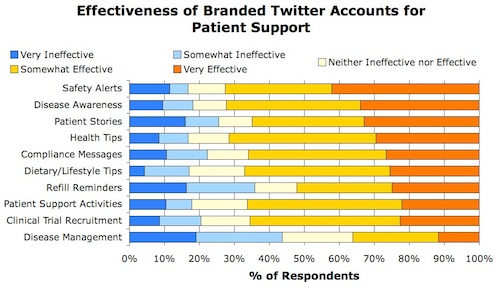What’s Your Opinion About Branded Patient Support via Twitter? (Survey ran from 30 August 2009 through 11 February 2010. N=96 reponses)
See Resources & Further Reading below…
Background
Virtually all pharmaceutical company Twitter accounts post mostly corporate news. These corporate Twitter accounts are not likely to be followed by patients.
Novo Nordisk, which has a Levemir-branded Twitter account (Race with Insulin), is the exception. However, that account so far has focused only on marketing and posting the daily trials, tribulations, and hopefully victories of spokesperson with diabetes and racecar driver Charlie Kimball.
Twitter has often been hyped as a great way to support customers. The customers of pharma are physicians and patients. But even pharma branded Twitter accounts like Race with Insulin offer very little in terms of patient support.
A branded, patient-focused Twitter account can be used in many ways to support patients. Such a Twitter account can deliver appropriate messages to followers who opt-in to follow via notices on the brand.com web site. Because of the viral nature of Twitter, one follower can lead to many more with very little extra effort or expense on the part of the sponsoring pharma company. If the posts are relevant to patient needs, followers will RT (re-tweet) and recommend that others follow.
This survey asked respondents’s opinions of using Twitter in this fashion and what they thought would be the regulatory, corporate cultural, training, and other barriers that would need to be overcome to achieve success.
Specifically, the survey asks how effective Twitter can be in carrying out each of the following patient support activities/communications:
- Drug/device safety alerts (eg, drug recalls, medical device malfunctions, emerging safety issues)
- Prescription management, including pharmacy refill reminders
- Daily health tips from authoritative sources
- Publishing disease-specific tips
- Clinical trial awareness & recruitment
- Enhancing health-related support groups (e.g. buddy-systems for depression)
- Providing around-the-clock disease management
- Patient-sharing of health-related experiences
- Issuing dietary/lifestyle tips
- Delivering adherence and compliance messages
Survey Results:
Select results are summarized in the chart below. Access a more detailed Summary of Responses here (pdf).

Related article:




![6 Digital Tools at the Center of Healthcare Digitalization [INFOGRAPHIC]](http://ec2-54-175-84-28.compute-1.amazonaws.com/pharma-mkting.com/wp-content/uploads/2021/04/6DigitalTools_600px-100x70.jpg)




